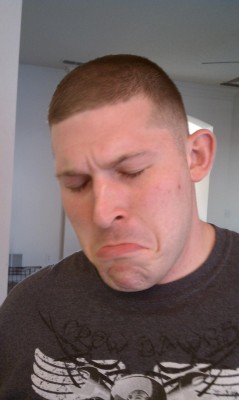Today’s post by Mike B.
I’m sure everyone has seen him: the guy whose bench PR is 225×5, and has been for five years. He comes in Monday, Wednesday, and Friday to knock out his flat, incline, and decline bench, along with some curls. He sometimes stares off into space when not flexing his “abs” in the mirror and wonders why his bench is “stuck”. Where this individual failed was in measuring his progress, or perhaps being ignorant that it’s been some time since he made any. I have been there myself, and that’s why I want to discuss several mistakes I made.
I’ve sucked at the bench press for years, and honestly, will probably never be amazing on the bench. Nevertheless, I continue to try and get better. While spending 4 years in England, I tried numerous ways to improve it. I bought boards, bands, and Westside Barbell seminars. I was determined to not suck…as much. For a while I did get better. Without ever being coached, and without knowing what the word “programming” meant, I increased my bench from a paltry 190 in 2005 to a less-than-respectable-for-powerlifters-but-OK-for-casual-gym-goers 295 when I left in 2009. I was still irritated, but at least it was going up.
Since moving to Texas I have managed to compete in 3 competitions, spaced out over the course of a year. In my first meet I hit 281, 292 in the second meet, and 303 in the third (all paused, obviously). Are these fantastic numbers for a guy my size? Absolutely not. However, they are indeed measurable gains. They mean that something I did between meets 1, 2, and 3 worked. By using the meets as a guide, I could at least tell that I was making progress. The four years I spent training in England was not in vain, but I think they would have been accelerated if I had started competing. Had I not competed in the past year, would I have known I was getting better? Personally, I think a powerlifting meet is the perfect opportunity to do so. If you leave your ego at the door, and just worry about performing as well as you possibly can that day, I don’t think there’s a more legitimate way of seeing how far you’ve come.
It’s also important to be brutally honest when measuring any type of progress. In the past six years, I’ve spent numerous months having to lose weight in order to pass my PT test. I always pass and then go right back to doing what I love to do: lifting heavy shit. Recently, this has become more difficult for me, particularly because the military has come down so hard on the PT program. Personally, my issue is the waist measurement. I’ll always be in decent enough shape to pass the sit-ups, push-ups, and run, but the waist circumference kills me. My belief is that I was built incorrectly in the factory (long arms/legs, short and wide torso), but that’s something I’ve learned to live with.
The challenge this past year has been to try and make sure that I don’t become too weak, but that my waist is still kept in check. When I started dieting back in November, I was convinced two months would be long enough for me to diet down and get my waist to a 37. I was wrong. During the months of November and December, I dieted (cut carbs significantly) and increased my cardio (moderately paced walking) dramatically, and looking in the mirror, I thought I was good. A week out from my test, I measured my waist. It was still a 39…fuck. Knowing that failure was not an option, I pulled out all the stops. I performed over an hour of cardio a day, decreased my calories once again, and within a week, was at a 37.5. Where did I go wrong? I failed to measure my progress. Instead of measuring my waist weekly, like I knew I should have been doing, I waited until the last minute. I was worried that if I measured too often, my methods of losing weight might become too drastic. This was a big mistake, and something I encourage you not to try.
In both cases I didn’t measure my progress correctly and was unaware of my gains. Logging your training is necessary to gauge progress in a training program, but you also have to take measurements that are relevant to your goal. I didn’t measure my waist and put myself in a shitty situation to have to lose an inch and half on my waist circumference in a week. I aimed to get stronger on the bench years ago but never really saw precise progress until I started competing. Again, I highly suggest competing in something to see where you’re at, no matter how “weak” you think your numbers are. Real vs. relative, right Brent?

